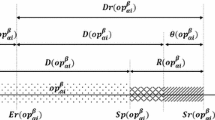Abstract
A deadlock condition for flexible manufacturing systems is characterized by a set of parts, which have been processed but cannot be discharged by a set of machines or buffers. To avoid such problems, it is necessary to adopt suitable control policies which limit the resource allocation in the system, thus affecting the overall system performance. In the present work, we address the problem of evaluating and comparing the performance of deadlock avoidance control policies applied to FMS. The problem is discussed for both untimed and timed models, and for models both with and without deadlock avoidance control policies. Different control algorithms, among the most common in the literature, have been considered. Imperfect deadlock avoidance control policies are also considered. In addition, some indices are proposed to assess the structural properties of FMS with respect to deadlock occurrence and their performance. Two different application examples are analyzed, with the help of a commercial simulation package. Finally, an adaptive algorithm which can learn from system evolution to avoid deadlocks is illustrated.
Similar content being viewed by others
References
Banaszak, Z. and Krogh, B. H. (1990) Deadlock avoidance in flexible manufacturing systems with concurrently competing process flows. IEEE Transactions on Robotics and Automation, 6(6), 724–734.
Desrochers, A. A. (1990) Modeling and control of automated manufacturing systems, IEEE Computer Society Press, Los Alamitos (CA).
Dijkstra, E.W. (1968) Co-operating sequential processes. In Programming Languages, F. Genuys (ed.), Academic Press, New York, pp. 43–112.
Epzeleta, J., Colom, J.-M. and Martinez, J. (1995) A Petri net based deadlock prevention policy for flexible manufacturing systems. IEEE Transactions on Robotics and Automation, 11(2), 173.
Fanti, M. P., Maione, B., Mascolo, S. and Turchiano, B. (1996a) Performance of deadlock avoidance algorithms in flexible manufacturing systems. Journal off Manufacturing Systems, 15(3), 164–178.
Fanti, M. P., Maione, B. and Turchiano, B. (1996a) Digraphtheoretic approach for deadlock detection and recovery in flexible production systems. Studies in Informatics and Control, 5(4), 373–383.
Fanti, M. P., Maione, B., Mascolo, S. and Turchiano, B. (1997) Event-based feedback control for deadlock avoidance in flexible production systems. IEEE Transactions on Robotics and Automation, 13(3), 347–363.
Ferrarini, L. and Araki, M. (1995) On deadlock occurrence in manufacturing systems. Proceedings of the INRIA/IEEE Conference on Emerging Technology and Factory Automation (ETFA' 95), Paris, France, 3, 141–152.
Ferrarini, L. and Maroni, M. (1998) Deadlock avoidance control for manufacturing systems with multiple capacity resources. International Journal of Advanced Manufacturing Technology, Special Issue on Petri nets and Manufacturing Systems, 16(1).
Joshi, S. B., Mettala, E. G. and Wysk, R. A. (1995) Formal models for control of flexible manufacturing cells: Physical and system model. IEEE Transactions on Robotics and Automation, 11(4).
Hauschildt, D. and Valk, R. (1985) Safe states in banker like resouce allocation problems. In Advances in Petri Nets, 222, W. Brauer (ed.), Springer Verlag, pp. 253–277.
Hsieh, F.-S. and Chang, S.-C. (1994) Dispatching-driven deadlock avoidance controller synthesis for flexible manufacturing systems. IEEE Transactions on Robotics and Automation, 10(2), 196.
Lee, D. Y. and DiCesare, F. (1994) Scheduling flexible manufacturing systems using Petri nets and heuristic search. IEEE Transactions on Robotics and Automation, 10(2), 123.
Lee, C. C. and Lin, J. T. (1995) Deadlock prediction and avoidance based on Petri nets for zone-control automated guided vehicle systems. International Journal of Production Research, 33(12), 3249.
Luggen, W. W. (1991) Flexible manufacturing cells and systems, Prentice-Hall International, London.
Minoura, T. and Ding, C. (1991) A deadlock prevention method for a sequence controller for manufacturing control. International Journal of Robotics and Automation, 6(3), 149.
Parrish, D. J. (1990) Flexible manufacturing, Butterworth-Heinemann, London.
Pegden, D. (1985) Introduction to SIMAN 3.0, Reference Manual.
Ramaswamy, S. E. and Joshi, S. B. (1996) Deadlock-free schedules for automated manufacturing workstations. IEEE Transactions on Robotics and Automation, 12(3), 391.
Revelotis, S. A. and Ferreira, P. M. (1996) Deadlock avoidance policies for automated manufacturing cells. IEEE Transactions on Robotics and Automation, 12(6), 845–857.
Silva, M. and Valette, R. (1989) Petri nets and flexible manufacturing. In Advances in Petri Nets, Springer Verlag, Berlin, 374–417.
Tamaki, H., Mukumoto, S., Nishikawa, Y. and Araki, M. (1994) Simulation-based scheduling package: models and solutions. Proceedings of the IEEE International Conference on Industrial Electronics (IECON' 94), Bologna, Italy, 1521–1526.
Viswanadham, N., Narahari, Y. and Johnson, T. L. (1990) Deadlock prevention and deadlock avoidance in flexible manufacturing systems using Petri net models. IEEE Transactions on Robotics and Automation, 6(6), 713.
Zhou, M. C., DiCesare, F. and Rudolph, D. L. (1992) Design and implementation of a Petri nets based supervisor for a flexible manufacturing systems. IFAC J. Automatica, 28(6), 1199–1208.
Wysk, R. A., Yang, N.-S. and Joshi, S. B. (1994) Resolution of deadlocks in flexible manufacturing systems: Avoidance and recovery approaches. Journal of Manufacturing Systems, 13(2), 128.
Xie, X. (1996) Deadlock-free dispatching control of manufacturing systems using Petri nets. Proceedings of the 13th IFAC World Congress, San Francisco, 507.
Xing, K.-Y., Hu, B.-S. and Chen, H.-X. (1996) Deadlock avoidance policy for Petri-net modeling of flexible manufacturing systems with shared resources. IEEE Transactions on Automatic Control, 41(2), 289.
Author information
Authors and Affiliations
Rights and permissions
About this article
Cite this article
Ferrarini, L., Piroddi, L. & Allegri, S. A comparative performance analysis of deadlock avoidance control algorithms for FMS. Journal of Intelligent Manufacturing 10, 569–585 (1999). https://doi.org/10.1023/A:1008964822278
Issue Date:
DOI: https://doi.org/10.1023/A:1008964822278




